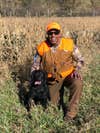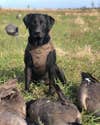A Q&A With Pheasants and Quail Forever’s New National Board Member, Douglas Spale
In an in-depth interview with F&S, Spale talks conservation, dog training, hunter recruitment, and the future of upland hunting

Douglas Spale, a lifelong hunter who grew up in rural Nebraska, was recently named to the National Board of Directors of Pheasants Forever and Quail Forever. Spale brings a depth of bird hunting experience to the organizations, as well a fresh perspective as a younger hunter that has spent most of his adult life living in cities. Spale recently moved to Kansas City, Missouri, from Chicago, Illinois. He’s a real-estate and land-use attorney for the Kansas City District of the U.S. Army Corps of Engineers.
Spale’s ability to promote hunting among city dwellers makes him a compelling pick for the leadership role at two of the nation’s most prominent upland bird hunting conservation organizations. Spale is not only an accomplished hunter, but also a gun dog trainer. He’s the author of a blog series called Bird Dog in the City, where he details his experience raising and training bird dogs in metropolitan areas. Spale recently lost a black lab named Sunka O’ War to an unexpected illness, but he is now training a Labrador pup named Nʉ̠a Kohtopʉ̠ (pronounced Naw Koo-towp, or just Kohtop for short). Spale’s blog posts are both informative and inspiring. His enthusiasm for hunting and hunting dogs is contagious—and it quickly became clear during our Q&A why Pheasants Forever and Quail Forever tapped him for their board.

F&S News Editor Sage Marshall: Congrats on your appointment to the Pheasants Forever and Quail Forever National Board. Why did you decide to take on this responsibility?
Douglas Spale: Conservation is a big thing for me—it’s been a big part of my life. I’ve always been devoted to the outdoors. This opportunity with the board of directors is a way to level up my ability to make an impact while being a part of an organization that has such a substantial role in conservation throughout the country.
SM: When did you start hunting?
DS: I grew up in a hunting family. My brothers hunted. My father hunted. My grandparents hunted. Hunting has always been a part of who I am. I was introduced to it at an early age. I don’t even remember my first hunt. I got my first gun dog when I was around 12. That’s really when the desire to hunt took hold, because I could bring my own dog along.
SM: What is it you love so much about upland bird hunting, in particular?
DS: I always enjoy the environment of bird hunting and the ability to have this really special relationship with a bird dog. I love that my labs and I can set down anywhere—after we’ve done enough scouting to figure out where the birds are—and enjoy a hunt, the scenery, and everything that goes into making that moment happen.
It takes a good year, at least, to get a dog where it needs to be to have a fully successful hunt. It’s a lot of work. But after you’ve done all the training, being able to enjoy those moments when a dog is doing everything you’ve done to get to that point is an accomplishment that I love most. So much goes into it. Then when it all comes together, it’s so rewarding.
SM: In one of your blog pots, I read that you made a promise to your dad to raise a dog that can hunt the great plains. Can you tell me about that?
DS: That was when I was living in Chicago. At the time, my father was diagnosed with cancer, and it was a pretty serious diagnosis. I moved home to be with him and take him to appointments. If you’ve known anyone who’s been through cancer, it’s a very, very difficult place, and I felt it was my duty to step up and help the family out by being there, even if it meant leaving my career.
As my dad started to improve, he always asked me if I was going to move back to Chicago. I said, “No, I’m going to stay here and take care of you, because you’ve done so much for me throughout my life.” He said, “No, leave. Chase your dreams. Bring me a dog back though…By next fall, we’ll hunt with that dog.” I said “OK, promise me you’ll get through all this chemo and stuff, and I’ll promise you that I’ll bring back a dog so we can hunt together again.”
SM: I live in a city, and like a lot of people that do, I’m a little unsure about raising a gun dog in an urban environment. How did you navigate that?
DS: The biggest thing was having that promise to my dad serve as my motivation. It really drove home the belief that I could do this. I really wanted to be a big-city lawyer, and I was able to do that. Luckily, I lived next to an open lot. I had this great space where I could train my dog every day—morning, midday, and evening. It worked out well. It was also a good way to balance myself. Being a younger attorney is not the most fun thing in the world as far as the workload. It helped to be able to have that outlet to train my dog, which gave me something to look forward to every day.
SM: So, would you recommend training a gun dog in the city?
DS: I would say that if you’re at a point in your life where you’re ready to welcome a dog, you need to figure out first what type of hunting you’re going to do, what type of dog you want, and what kind of training program is good for you. Test those variables first before you think, Oh, I live in a downtown apartment in Minneapolis, and I want a bird dog because other people have done it. My purpose in continuing this narrative is to show you that you can do it if you have the desire for it and can control the other variables in your life. Don’t miss out on an opportunity to have a special relationship with a special dog because of where you are geographically.
SM: Can you tell me about your new dog, Nʉ̠a Kohtopʉ̠ ? How’s she coming along?
DS: She came into my life this winter after my last dog passed away. She’s my third Labrador. Her name means “my fire” in the Comanche language. When I lost my last dog, I was very depressed. Fortune had it that eventually I got to select a new pup. I felt like my internal fire to go hunting, do stuff in the outdoors, and work on conservation reignited. I’m so excited to start our journey this hunting season and travel around together.
SM: Losing a dog can be such a hard thing. Can you talk about the process of losing a dog to being ready for a pup? I think a lot of people struggle with that.
DS: To lose a dog is one of the hardest things many people go through in life, though I’m not at all comparing it to losing a family member. But dogs become so engrained in our daily routines that it’s difficult to go through grief when you lose them. Sunka and I had an amazing three and a half years together. Losing her felt like a failure on my part. But it was just a freak abscess. Nothing could have been done, it just happened. It was very difficult.

Nancy, one of the board members on Pheasants Forever, reached out afterward and asked if I was going to get another dog. I said, “No, not for a while.” She was like, Why not? She thought that training a dog in the city would be cool. I said “OK, I’ll get one.” Then I told her about my idea for writing a series on it, and she told me I should. Well, I did.
Going from a great finished bird dog to a puppy is challenging. While a puppy brings a lot of life and happiness for a little bit, part of this journey has also been trying not to compare her to the last one. Sunka was a fantastic gun dog and member of my family. A puppy takes a while to develop some character. There’s not a lot of depth to the love. But as we’ve grown together, I’ve really loved developing that bond with her that will just continue to grow and grow.
SM: What are your goals for your new role with Pheasants and Quail Forever?
DS: As these organizations have begun to work on creating more hunters and more diverse audiences in the upland realm, I feel that I can have a positive input as someone that lives and works in diverse, metropolitan areas. Some of the attributes that I have as an individual, like training bird dogs and being passionate about upland hunting, can be beneficial to the organizations’ missions. I’m just a part of this. I hope I can be a positive role model.
SM: You’re now an ambassador tasked with recruiting, retaining, and reactivating bird hunters. How do you plan to do that?
DS: I’m currently in Kansas City. As far as the upland bird hunting community goes, I’m basically six to 10 hours from many prime locations. That ambassador role allows me to travel to different events and places in the Great Plains states. I really want to go out and enjoy the Pheasants and Quail Forever communities in these areas.
SM: As I mentioned earlier, I live in a fairly big city, and the hunting community still isn’t very well developed here. Do you think it’s important to change that and get more city folk into the sport?
DS: Absolutely. If you look at the population demographic of the country, the majority of people are in cities. While the hunting community may cater to rural audiences, from my experience, I know there are plenty of city people that enjoy the outdoors—hiking, fishing, camping, skiing. Finding the bridge to connect those two worlds is important. There is so much more in common between urban and rural communities, as opposed to things that separate them.
Part of doing this is my dog. I hope that people like me because I have a cool dog. That’s a good way to start those connections—focus on our shared love of dogs regardless of geographic locations. Then, let’s talk about other things that we might like such as conservation.

SM: OK, so what are some of the challenges facing upland bird hunters—and bird populations—right now?
DS: Habitat. Cultivating habitat, as well as access to it. I’m no scientist, but conservation organizations are always concerned about enhancing habitat. The lack of habitat is one of the bigger issues—if not the biggest—that impacts the future of upland hunting, not to mention the diversity of nature. If we lose that, we lose out on so many benefits.
SM: Going forward, what are your dreams for the future of upland bird hunting?
DS: I would hope that more people get out, explore, and understand the beauty that is in the uplands. I always say that we live in this balance with nature. Nature can give us so much more than we can expect when we do things outside. I hope that more people can go out there and enjoy those peaceful, serene moments in the uplands—and also the woods, prairies, swamps, mountains, anywhere.
SM: And for yourself, what are your goals?
DS: One is to develop my pup into a fine bird dog—but also to make sure I give her the best life possible. She comes with a nice pedigree and a lot of built-in instincts. I hope that I can get everything out of her.
And I hope that my devotion inspires others to get a pet, to conserve some acres, or to donate to a conservation organization. Our balance with nature is delicate, and we need to be able to preserve and enhance it because we take so much from it.
I also want to hunt in every state. That’s one of my bucket-list things.
This interview has been edited for clarity and concision.
